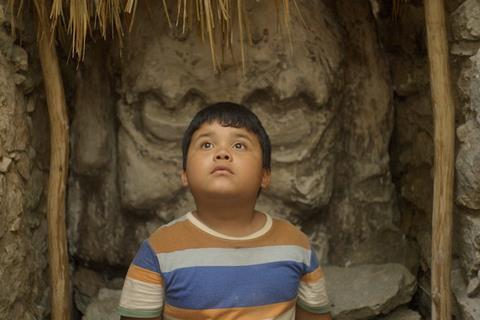The Mayan ruins in Yucatan are fertile ground for a young boy’s fascination with death in this Edinburgh highlight

Dir/scr: Manuela Irene. Mexico. 2024. 76 mins
A charming take on a small boy’s obsession with what happens after we die, Manuela Irene’s imaginative Xibalba Monster is also a fine example of how new life can be breathed into old themes by unfamiliar settings. Largely taking place amongst the Mayan ruins in Mexico’s Yucatan Peninsula, the film elegantly fuses the dark, lurid dreams of an eight-year-old with the dark, lurid mythology of the Mayas, and the result is a fascinating fusion of light and darkness, rooted in a striking central performance by the young Rogelio Ojeda. Although it crams a little too much into its short running time, it represents a distinctive calling card for first-timer Irene.
A fascinating fusion of light and darkness
Chubby and bookish, eight-year-old Rogelio (Ojeda, a first-timer like all the actors) is sent to spend his summer holidays with his nanny Eduarda (Teresa Sanchez) in her home on the Yucatan Peninsula. Rogelio is the kind of kid who never stops asking questions about what happens to people after they die, and his curiosity is only sharpened when he witnesses the aftermath of a car crash en route to Eduarda’s village.
On arrival, Rogelio falls in with two other kids, Lucio (Leonel Pat Yeh) and Juanito (Gibran Alonzo). At first they pick on him, but later they take Rogelio to Ek Balam, an area steeped in Mayan history and myth, and seemingly teeming with spirits. The museum there sends Rogelio’s imagination into overdrive: entranced, he watches a video about children being sacrificed to the Lords of Xibalba (the Mayan version of hell, according to their sacred text, the Popol Vuh) by being thrown into a deep pool.
For a kid like Rogelio, Yucatan is the perfect holiday location. Death never seems to be far away, whether in the warning sign against the dengue mosquito that greets visitors to the town, the dead animals in the street or the dark iconography of the sculptures in the ruins. Ailing, elderly local hermit Don Emilio (Manuel Irene) has the misfortune of being entwined in the kids’ minds with the mythical figure of the Xibalba – a notion which seeing the old man slaughter a sheep does little to dislodge. Things turn darker over the film’s final stretch, which explores the hesitantly developing relationship between Don Emilio and Rogelio, who adopts the lamb that Emilio saves from the sheep’s womb.
Amongst other things, Xibalba Monster is about Western society’s repression of death – which may be exactly why Rogelio is so fascinated by it. The ancient cultures of Mexico have a different and more open relationship to mortality which, as Rogelio the outsider discovers, can be liberating.
On the brighter side, there are moments of surreal visual comedy, some wonderfully staged visuals – such as a sequence featuring Lucio and Juanito rapping in a Mayan language against a backdrop of ruins – and the ever-present dappled sunlight that sets the visual tone. At one point, Rogelio sees a Mayan sculpture that reminds him of Mickey Mouse, one of several scenes to wittily juxtapose Mayan culture with the modern day.
Music is used strangely, with Rogelio appearing to listen to jazz and funk through his headphones, which feels unlikely. Even riskier is the use of standard orchestral horror score motifs to accompany the scary, blurred visions that Rogelio sometimes has as he sleeps or daydreams. Yet, despite the darkness of its themes, Xibalba Monster never feels ponderous, and this is largely down to its young protagonist. With his puzzled, innocent expression as he cycles through the darkened streets of the village with a lamb in his handlebar basket, Rogelio is a figure so bursting with life that you doubt that death could ever get the better of him.
Production companies: Cine Provincia, Colectivo Colmena, Bar Producciones
International sales: Cine Provincia cine.provincia@gmail.com
Producers: Manuela Irene, Damian Aguilar, Daniel Loustaunau
Cinematography: Damian Aguilar
Production design: Selva Tulian
Editing: Manuela Irene, Liora Spilk
Music: Tomas Barreiro
Main cast: Rogelio Ojeda, Teresa Sanchez, Manuel Irene, Gibran Alonzo, Leonel Pat Yeh















![[L-R]: Amanda Villavieja, Laia Casanovas, Yasmina Praderas](https://d1nslcd7m2225b.cloudfront.net/Pictures/274x183/6/4/1/1471641_pxl_20251224_103354743_618426_crop.jpg)








